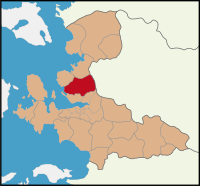Menemen massacre
| Menemen massacre | |
|---|---|
| Part of Greco-Turkish War (1919–22) | |

Location of Menemen within metropolitan Izmir.
|
|
| Location |
present-day Menemen and Izmir Province, Turkey |
| Date | 17 June 1919 |
| Target | Turkish |
|
Attack type
|
massacre |
| Deaths | 5000 killed, 200 wounded. |
| Perpetrators | Greek army |
The Menemen Massacre occurred on June 16–17, 1919 in the town of Menemen, shortly after the Greek forces landed in nearby Smyrna, as part of the post World War I Greek occupation of Turkey.
The Ottoman prefect of Menemen, Kemal Bey, and the six gendarmes accompanying him were assassinated by Greek soldiers in the evening of the first day. These deaths became the opening act for further killings carried out on the civilian population of Menemen the following day by a Cretan brigade aided by a number of accomplices from the local Greek minority. The event was termed as a "massacre" by an inter-allied commission composed of four generals representing the Allied Powers.
The number of casualties among the civilian Turkish population of the town during the single day of June 17 vary between two hundred, according to the October 1919 report drawn up by the Inter-Allied Commission; to one thousand, according to a delegation that arrived the next day (June 18, 1919). Captain Charns, the head of that delegation, contrasted the number of Turkish victims against the non-existence of any Greek wounded, either civilian or military. The October report, prepared by the British officers and medical delegates from the British and Italian consulates in Smyrna, rejected the 1000 casualties figure as an exaggeration, finding that at least 100 had died, and mentioning a French officer's investigation the day after the massacre reporting that 200 Turks had been killed, and 200 injured.
The events were protested by the Ottoman Sheikhulislam. The Greek military claimed that they were attacked in the town, but the commission did not give credit to their statements.They found the Greeks alone responsible for the bloodshed.
Historian Justin McCarthy, rejecting the findings of the Inter-Allied Commission, claimed the massacre was preplanned, indicated by the fact that before the attacks all Greek houses in the city had been marked with white crosses and were not affected by the pillage and destruction.
...
Wikipedia
